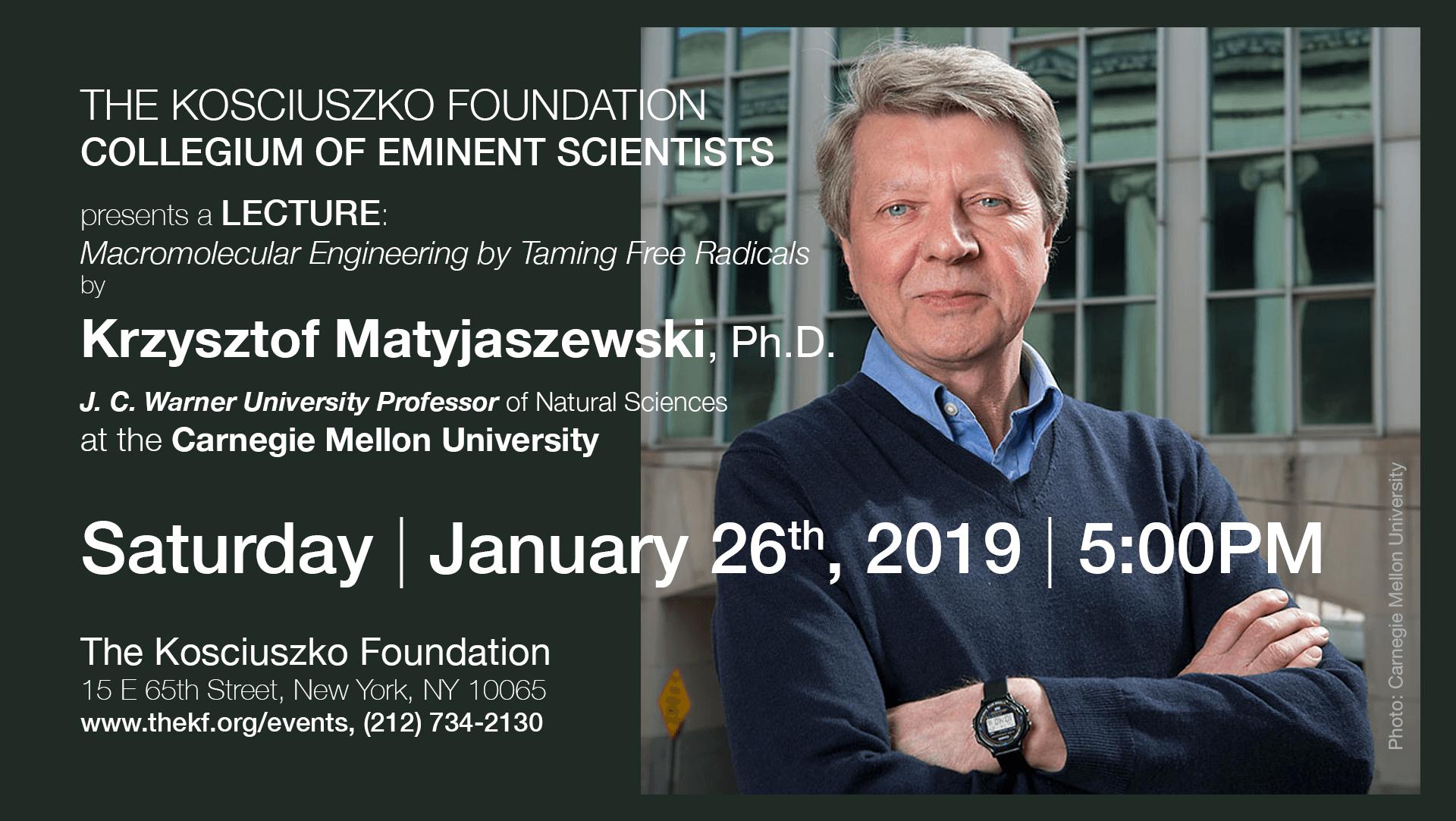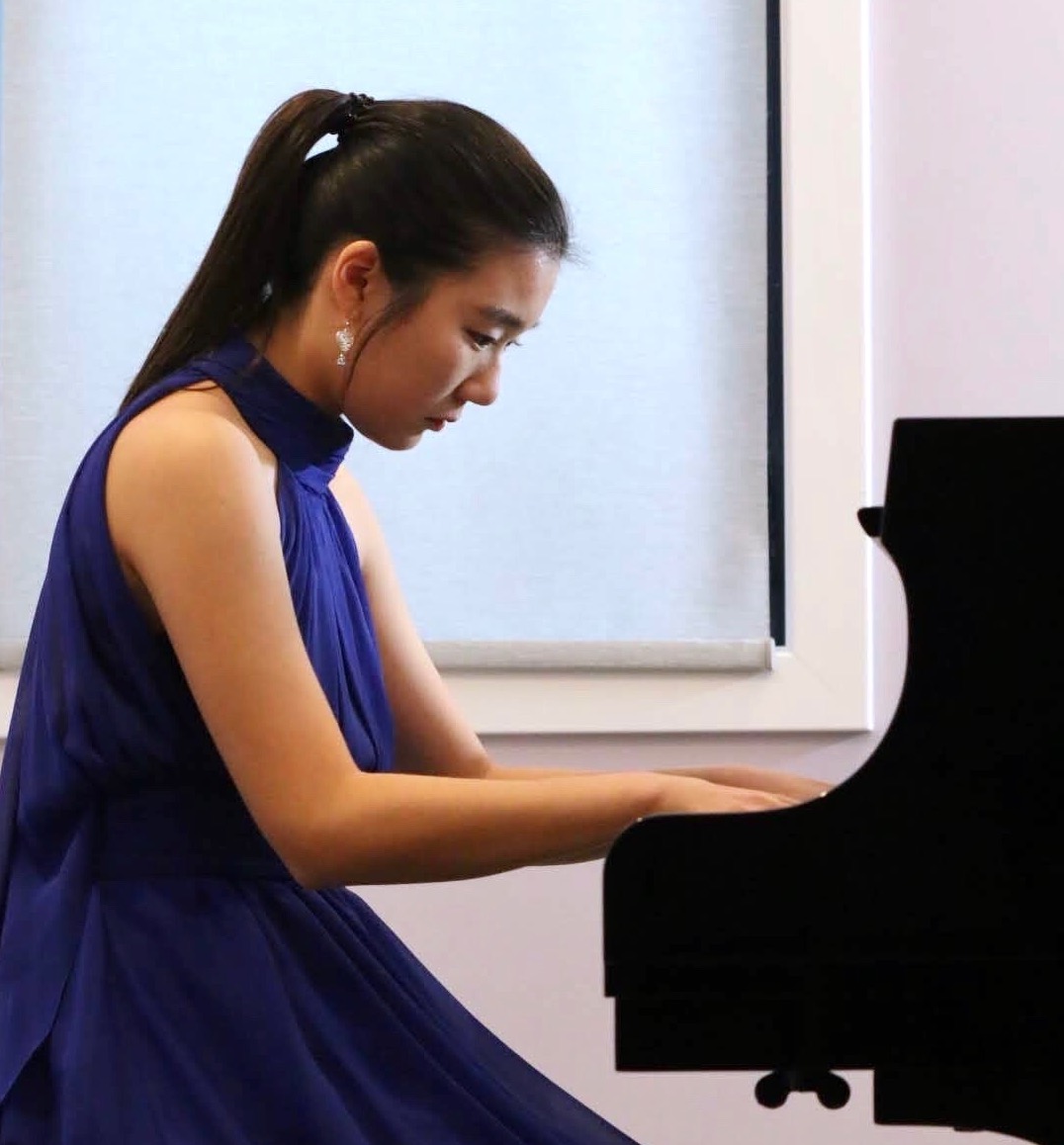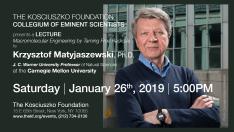
Past events
A lecture by Prof. Krzysztof Matyjaszewski/ KF Collegium of Eminent Scientist Event Series
Saturday, January 26, 2019, at 5:00pm
The Kosciuszko Foundation Collegium of Eminent Scientists
Presents:
Macromolecular Engineering by Taming Free Radicals
A lecture by Prof. Krzysztof Matyjaszewski
J.C. Warner Professor of the Natural Sciences at the Carnegie Mellon University, one of the world's foremost researchers in the field of polymer chemistry
The lecture will be followed by a piano recital by Heather Hsun Chang presenting selections from:
- Schumann's Symphonic Etudes Op.13
- Chopin's Ballade No.4, Op.52
Saturday, January 26, 2019, 5:00 p.m.
The Kosciuszko Foundation: 15 E 65th Street, NYC
Macromolecular Engineering (ME) can be defined as a process comprising rational design of (co)polymers with specific architecture and functionality, followed by precise and efficient polymer synthesis and processing in order to prepare advanced materials with target properties. Preparative ME requires controlled / living polymerization. Radical polymerization could be very well suited for ME due to tolerance to many functionalities. Unfortunately, free radicals are difficult to be controlled, have very short life times (<1 s) and are involved in side reactions. Taming free radicals has been very challenging but was eventually accomplished by living radical polymerization with dynamic equilibria between minute amounts of free radicals and large pool of dormant species. Copper-based ATRP (atom transfer radical polymerization) catalytic systems with polydentate nitrogen ligands are among most efficient controlled/living radical polymerization systems. ATRP of vinyl monomers was employed for macromolecular engineering of polymers with precisely controlled molecular weights, low dispersities, designed shape, composition and functionality. Examples of block, graft, star, hyperbranched, gradient and periodic copolymers, molecular brushes and organic-inorganic hybrid materials and bioconjugates prepared with high precision will be presented. These polymers can be used as components of various advanced materials such as health and beauty products, biomedical and electronic materials, coatings, supersoft elastomers, lubricants, or sealants. Special emphasis will be on nanostructured functional hybrid materials for application related to environment, energy and catalysis.

Krzysztof Matyjaszewski is J.C. Warner University Professor of Natural Sciences at Carnegie Mellon University. He discovered Cu-mediated atom transfer radical polymerization, commercialized in 2004 in US, Japan and Europe. He has co-authored >1,000 publications (cited 98,000 times, h-index 150), co-edited 20 books, >90 book chapter and holds 61 US patents. He is the editor of Progress in Polymer Science. Matyjaszewski received 2017 Franklin Medal in Chemistry, 2015 Dreyfus Prize in Chemical Sciences, 2014 National Institute of Materials Science (Japan) Award, 2012 Prize of Société Chimique de France, 2012 Maria Curie Medal, 2011 Wolf Prize in Chemistry, 2009 Presidential Green Chemistry Challenge Award, and from the American Chemical Society: 2019 Chemistry of Materials Award, 2015 Overberger Prize, 2013 AkzoNobel North America Science Award, 2011 Hermann Mark Award, 2011 Award in Applied Polymer Science, 2002 Polymer Chemistry Award, 1995 Creative Polymer Chemistry Award. He received eleven honorary degrees (Ghent, Lodz, Athens, Moscow, Toulouse, Pusan, Paris, Haifa, Poznan, Padova and Coimbra) and is a member of National Academy of Engineering, Polish Academy of Sciences, Russian Academy of Sciences, honorary member of Israel and Chinese Chemical Society and a fellow of National Academy of Inventors, IUPAC and American Chemical Society. MORE
Watch interview with Prof. Matyjaszewski on YouTube: HERE
 20-year-old pianist Heather Hsun Chang has already performed quite extensively, both as a very young pianist in her native country, Taiwan, and in more recent years, in various cities on both coasts of the United States. Heather is currently a sophomore at Columbia University majoring in Neuroscience and Behavior, and she is a part of the Columbia Music Performance Program studying under Reiko Uchida and Magdalena Baczewska. She attended the San Francisco Conservatory of Music Pre-College Division where she is a Hurlbut-Johnson Preparatory scholarship student. Heather has participated in numerous competitions and was a top prize winner in the New York Piano Competition, the American Prize, the Young Pianist's Beethoven Competition, the ENKOR International Piano Competition, Ross McKee Piano Competition, Pacific Musical Society Competition, the San Francisco Chopin Competition, and the Kawaii Piano Competition, Taiwan Regional. To add on, Heather was chosen as a finalist winner for the National YoungArts Foundation and was invited to 2015 YoungArts Week in Miami, Florida. MORE
20-year-old pianist Heather Hsun Chang has already performed quite extensively, both as a very young pianist in her native country, Taiwan, and in more recent years, in various cities on both coasts of the United States. Heather is currently a sophomore at Columbia University majoring in Neuroscience and Behavior, and she is a part of the Columbia Music Performance Program studying under Reiko Uchida and Magdalena Baczewska. She attended the San Francisco Conservatory of Music Pre-College Division where she is a Hurlbut-Johnson Preparatory scholarship student. Heather has participated in numerous competitions and was a top prize winner in the New York Piano Competition, the American Prize, the Young Pianist's Beethoven Competition, the ENKOR International Piano Competition, Ross McKee Piano Competition, Pacific Musical Society Competition, the San Francisco Chopin Competition, and the Kawaii Piano Competition, Taiwan Regional. To add on, Heather was chosen as a finalist winner for the National YoungArts Foundation and was invited to 2015 YoungArts Week in Miami, Florida. MORE
The Kosciuszko Foundation Collegium of Eminent Scientists was established in 2012 with the goals to: 1. to honor eminent scientists of Polish origin and ancestry who have achieved recognition in the USA; 2. to recognize, highlight, and publicize their achievements and important contributions to the respective fields of science. Significant achievements by Polish scientists will be provided to news media and made accessible through the internet; 3. to identify, record, and catalogue eminent Polish scientists and scientists of Polish descent residing in America.
The names of distinguished scientists on the Collegium's list include four Nobel Prize winners: Andrew Schally (physiology or medicine, 1977), Roald Hoffmann (chemistry, 1981), Frank Wilczek (physics, 2004), and Jack Szostak (physiology or medicine, 2009). Several winners of the Alfred Jurzykowski Foundation Prize (the "Polish Nobel") add to the Collegium's prestige. They include: Waclaw Szybalski, a pioneer in molecular biology; Jacek Hawiger, molecular physiologist; Karl Maramorosch, virologist; Aleksander Wolszczan, astronomer, and the mathematicians Andrzej Ehrenfeund, Tadeusz Iwaniec, Henryk Iwaniec, Krystyna Kuberberg, and Jan Mycielski. Chemists are well represented by Krzysztof Matyjaszewski, creator of a new branch of polymer chemistry and the recipient of numerous international prizes and awards, and the distinguished chemists Krzysztof Pankiewicz and Waldemar Priebe. MORE


